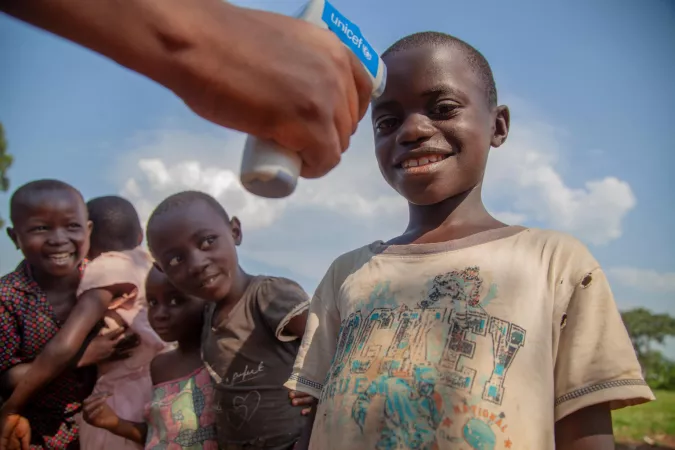UNICEF teams up with Ebola survivors to help stop spread of deadly outbreak in the Democratic Republic of the Congo

- Available in:
- English
- Français
KINSHASA/DAKAR/NEW YORK/GENEVA, 28 September 2018 – Recent survivors of the Ebola virus and UNICEF are partnering to help prevent further transmission of the deadly disease in the eastern Democratic Republic of the Congo (DRC). As part of this effort, the survivors share their stories during public events and through public radio in Ebola-affected communities.
Forty-three people have survived the Ebola virus since the beginning of the latest outbreak in August.
“The survivors are living proof that it is possible to recover from the Ebola virus disease, especially if it is detected and treated early,” said Dr. Gianfranco Rotigliano, UNICEF Representative in the DRC. “The testimonies of these Ebola-survivors help us to reduce the fear in the communities and to encourage people with Ebola-like symptoms to look for early treatment, thereby avoiding the risk of further contamination.”
Lack of awareness of prevention measures and treatment of the disease among the population increases the risk of further spread of the disease, as shown by the newly confirmed case of Ebola in the Tchomia health zone. In response to this case, UNICEF has deployed a team to help with the Ebola-response put in place by the Government and now has response teams operating in Mangina, Beni, Butembo and Tchomia.
Survivors’ testimonies in Mangina, the most affected health area in the current epidemic, has already been effective. Thanks to the increased trust in the Ebola treatment centres, the understanding of the importance of early detection and follow-up on suspected cases, increased knowledge of prevention measures, the area has experienced a significant reduction in the rate of new confirmed Ebola-cases.
UNICEF is also starting to work with the first Ebola-survivors from Ndindi, a neighbourhood in the city of Beni, the other epicentre of the epidemic.
“Giving Ebola-survivors the opportunity to share their experiences publicly also contributes to reducing stigma,” said Dr. Rotigliano. “It gives survivors a positive role in their communities and helps them to recover from the challenge of having been infected by the Ebola virus.”
UNICEF and its partners continue to provide Ebola-survivors with psychosocial and material assistance, as is the case with families and children that are affected by Ebola-disease.
Media contacts
Additional resources
About UNICEF
UNICEF promotes the rights and well-being of every child, in everything we do. Together with our partners, we work in 190 countries and territories to translate that commitment into practical action, focusing special effort on reaching the most vulnerable and excluded children, to the benefit of all children, everywhere.
For more information about UNICEF and its work for children, visit www.unicef.org.
Follow UNICEF West and Central Africa on Twitter and Facebook
Follow the latest information on the North Kivu Ebola outbreak on our crisis page





